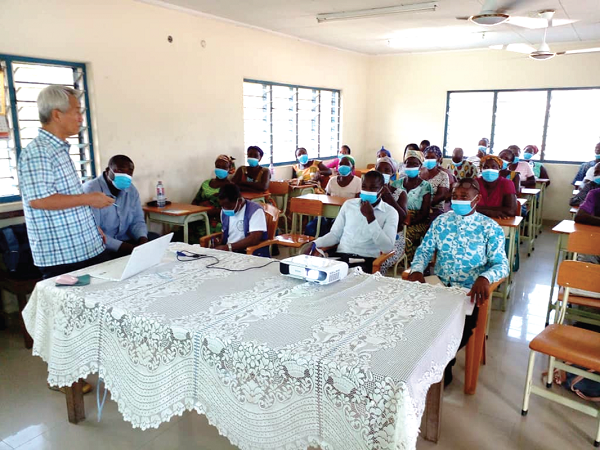
MoFA, KOICA build capacity of rice farmers- Forms part of project to shore up local rice production
Forty rice farmers and agricultural extension agents in the Gomoa East District in the Central Region have benefitted from a two-day capacity-building training aimed at increasing Ghana’s local rice production.
The practical-oriented training, which is under the Rice Value Chain Improvement Project (RVC), is a bilateral cooperation between the governments of Korea and Ghana.
The $8-million project, being implemented from 2020 to 2023, is being funded by the Korean International Cooperation Agency (KOICA), in partnership with the Ministry of Food and Agriculture (MoFA).
The four-year project is being implemented in five rice-growing districts in the Central Region, namely, Gomoa East, Twifo-Atti-Morkwa, Assin North and Assin South, as well as the Assin Fosu municipality.
It aims to increase output, strengthen post-harvest management capacity, improve rice processing and packaging, as well as strengthen farmer-based organisations (FBOs) and marketing support.
Rice consumption figures
The per capita rice consumption in 2016/2017 was estimated at about 35 kilogrammes per year.
In 2018, rice imports for Ghana were about $451,881, and with Ghana’s population rising each year, rice consumption is expected to reach 63kg per capita by 2020.
Therefore, the government of Ghana, through MoFA, seeks to improve local rice production, reduce importation and the value chain by 2023 as part of its poverty reduction strategy to improve the livelihoods of small-holder farmers across the country..
Purpose
Addressing the participants last Wednesday, the Project Manager of the KOICA RVC project, Dr Sang Yeol Kim, said the purpose of the training was to provide short-term rice cultivation for about 360 rice farmers in the five beneficiary districts.
He said “this training is to provide on-the-spot rice production technology to address the concerns of rice farmers on basic agricultural practices in rice cultivation that will increase rice yield”.
Training essential
Dr Kim said the training programme was essential, as it would help the farmers to hit the optimum yield required to shore up the national figures in terms of rice production.
He disclosed that a key component of the project was the setting up of a rice mill at Assin Akropong to process and package the rice for the local market to improve local rice consumption.
Irrigation system
The Gomoa East Director of the Department of Agriculture, Ms Hasnau Hashim, said the Gomoa Okyereko community was one of the communities in the district well noted for rice production due to the availability of a state-of-the-art irrigation facility.
She noted that over the years, rice farmers in the community received both technical and logistical support to enhance their production, saying “that notwithstanding, there is the need for the farmers to be exposed to routine training and new farming methods to boost their production”.
Apply knowledge
While acknowledging the fact that it was the first time rice farmers had been taken through training, Ms Hashim admonished the participants to put the skills learnt and the knowledge gained to good use to enable them to reap the full benefit.
She added that the training had been an eye opener for the farmers and they should, therefore, do everything possible to apply the new methods and knowledge to improve their yield to enhance rice production in the country.
Participants speak
One of the participants, Madam Regina Apawo, who has more than 16 years’ experience in rice production, indicated that the training had been very helpful, since she had been exposed to many things that would enhance her farming activity.
Another participant, Mr Kwame Ansah, a rice farmer for more than 25 years, said the farmers would adopt the proper methods learnt at the training to improve their work to help reduce rice imports.
